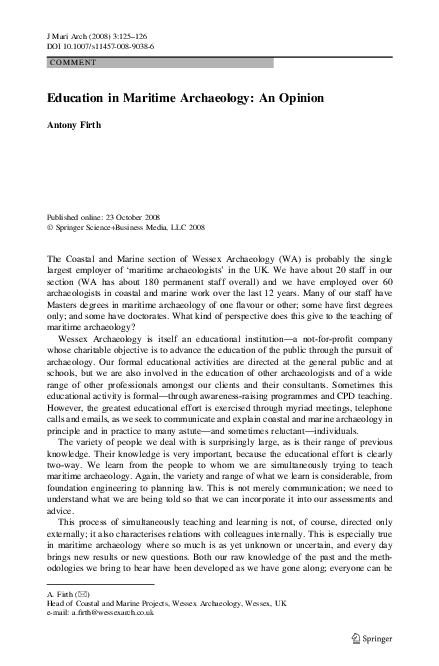Academia.edu no longer supports Internet Explorer.
To browse Academia.edu and the wider internet faster and more securely, please take a few seconds to upgrade your browser.
Education in Maritime Archaeology: An Opinion
Related Papers
Journal of Maritime Archaeology
Present Demands and Educating a New Generation of Maritime Archaeologists2008 •
Journal of Maritime Archaeology
Strategies for teaching Maritime Archaeology in the 21st century.2008 •
""Maritime archaeology is a multi-faceted discipline that requires both theoretical learning and practical skills training. In the past most universities have approached the teaching of maritime archaeology as a full-time on-campus activity designed for ‘traditional’ graduate students; primarily those in their early twenties who have recently come from full-time undergraduate study and who are able to study on-campus. The needs of mature-age and other students who work and live in different places (or countries) and therefore cannot attend lectures on a regular basis (or at all) have largely been ignored. This journal article provides a case study in the teaching of maritime archaeology from Australia that, in addition to ‘traditional’ on-campus teaching, includes four main components: (1) learning field methods through field schools; (2) skills training through the AIMA/NAS avocational training program; (3) distance learning topics available through CD-ROM and using the Internet; and (4) practicums, internships and fellowships. The author argues that programs to teach maritime archaeology in the twenty first century need to be flexible and to address the diverse needs of students who do not fit the ‘traditional’ model. This involves collaborative partnerships with other universities as well as government underwater cultural heritage management agencies and museums, primarily through field schools, practicums and internships.""
American Journal of Archaeology
Review Article: Is Maritime Archaeology on Course?2000 •
Page 1. REVIEW ARTICLES Is Maritime Archaeology on Course?1 DAVID J. BLACKMAN MARITIME ARCHAEOLOGY: A READER OF SUBSTAN-TIVE AND THEORETICAL CONTRIBUTIONS, edited by Lawrence E. Babits and Hans Van Tilburg. ...
2009 •
2013 •
Public Archaeology
'Perspectives in Maritime Archaeology': Challenging Popular Perceptions through Online Learning2023 •
In 2019-21, research was carried out at the University of Helsinki regarding the development of the degree programme in maritime archaeology. To develop the teaching of the programme, we designed and launched an online learning platform. The platform, entitled 'Perspectives in Maritime Archaeology', consists of lectures by international experts and literature on a variety of topics ranging from boatbuilding to seamanship and from trade and exploration to public outreach and contemporary art. The purpose of the platform was to convey a broad image of the discipline and promote multidisciplinary thinking among students. To assess the success of the platform in achieving this objective, we conducted surveys on student expectations and satisfaction as well as on (potential) changes in the perceived image of maritime archaeology. We discovered that a kaleidoscopic and eclectic approach to teaching maritime archaeology online made the topic more interesting to the students and helped them understand the variety and importance of different approaches to researching maritime archaeology. In this article, we report the findings of our research on the development of online learning and discuss them in the wider context of higher education in maritime archaeology. We conclude with a reflection on the potential use of poetry and metaphor in teaching holistically about the cognitive and cultural relevance of water.
RELATED PAPERS
Women, Gender and Research
Teaching about Food, Sex and Gender in the Classroom2015 •
International Journal for the Semiotics of Law
2023 - Sacred Foe: About the Face of Exemplary Evil2024 •
Journal of French and Francophone Philosophy
Les arbres de la connaissance1993 •
Human Resource Management Review
Mindfulness-based training interventions for employees: A qualitative review of the literature2017 •
International Journal of Science and Research (IJSR)
Potential Spore-Forming Probiotics Isolated from Ntoba mbodi, Alkaline Fermented Leaves of Cassava from the Republic of the Congo2017 •
Journal of Clinical Oncology
Development and external validation of a novel risk score to identify insignificant prostate cancer2017 •
Computers, Materials & Continua
Atmospheric Convection Model Based Digital Confidentiality Scheme2022 •
Indonesian Accounting Literacy Journal
Evaluasi Penerapan Sistem Pengendalian Internal Dalam Pencegahan Kecurangan Persediaan Dengan Menggunakan Kerangka Kerja COSO2022 •
2014 •
Neue politische Literatur
Mustafa Hamid: Al-Qaeda’s “Most Important Historian” or a Distorting Propagandist and Ideologue?2024 •
RELATED TOPICS
- Find new research papers in:
- Physics
- Chemistry
- Biology
- Health Sciences
- Ecology
- Earth Sciences
- Cognitive Science
- Mathematics
- Computer Science

 Antony Firth
Antony Firth